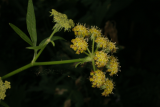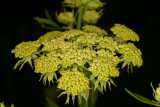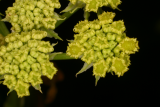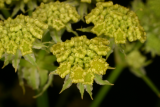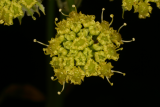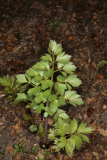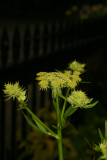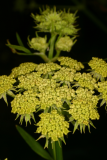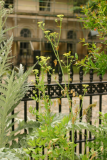Additional notes (click to expand)
Horticulture
Only one Diptera miner, the tephritid Euleia heraclei, is recorded on Levisticum in Britain. Time of year - mines: April, June-August, October-November. Time of year - adults: May-August.
Pitkin B., Ellis W., Plant C., Edmunds R. The Leaf & Stem Mines of British Flies & Other Insects www.ukflymines.co.uk
Medicinal
Traditional Herbal Medicine Registration (THMR).
Culpeper: under ‘Herbs’ he writes: ‘Livisticum. Lovage. Clears the sight, takes away redness and freckles from the face.’ Under ‘Roots’: ‘Levistici. Of Lovage. ... exceeding good for any diseases coming of wind.’
Culpeper, Nicholas. (1650). A Physical Directory . London, Peter Cole.
Other use
Notes: Used to be eaten ,like celery, in the middle ages or candied in the same manner as Angelica. It can be used as a tea, but the summer cordial called ‘Lovage’ is not prepared from this plant.
Oakeley, Dr. H. F. . (2013). The Gardens of the Pharmacopoeia Londinensis.
link
Toxicity
Contains 8-methoxy-psoralen, a furocoumarin, which is genotoxic and possibly carcinogenic. Produced adenomas and adenocrciomas of the kidney, and adenocarcinomas of the Zymbal gland.
van den Berg, S.J.P.L., Restani, et al., P.. (2011). Levels of Genotoxic and Carcinogenic Compounds in Plant Food Supplements and Associated Risk Assessment. Food and Nutrition Science 2: 989-1010.
link
May cause skin allergies.
Professor Anthony Dayan, 2022
Geographical distribution
- Asia-Temperate, Western Asia, Afghanistan
- Asia-Temperate, Western Asia, Iran
Levisticum officinale W. D. J. Koch
Family: APIACEAEGenus: Levisticum
Species: officinale W. D. J. Koch
Common names: Lovage; Bladderseed
Pharmacopoeia Londinensis name: Levisticum
Distribution summary: Western Asia
Habit: Perennial
Hardiness: H4 - Hardy; average winter
Habitat: Scrub and waste land
Garden status: Currently grown
Garden location: Europe & Middle East (J), Pharmacopoeia Londinensis 1618 'Seeds & Grains' (HSE 7)
Flowering months: July, August
Reason for growing: Medicinal, other use, traditional herbal registration
